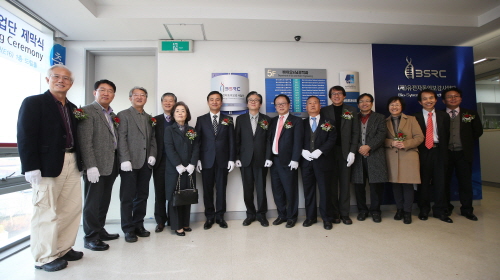policy
- Medicine using traditional natural substances • Food product source technology development begins
- Over 150,000,000,000 Won for 10 years of work invested to develop source technology
- Opening ceremony held on November 26th at 3 p.m. in Bio & Brain Engineering Division Building
The research to develop medicine and food source technology using traditional natural substances hasbegun.The opening ceremony of the “Genetic Donguibogam” business group, with KAIST Department of Bio & Brain Engineering Professor Do Heon Lee as the leader, was held on November 26th at 3 p.m. in Dream Hall, Bio & Brain Engineering Division Building, KAIST, Daejeon. The attendees of the opening ceremony included Yo Eop Im, Head of the Future Technology Department of the Ministry of Science, ICT and Future Planning and around 200 experts in science and technology industry, including the National Research Foundation of Korea, KAIST, the Korea Institute of Science and Technology, Seoul National University and Yonsei University.
The business group was established to re-interpret traditional natural substances proved to be effective from experience and improve quality of life by researching its applications; and to develop integrated source technology using traditional natural substances. The group is to invest over 150,000,000,000 Won for 10 years of research to secure natural substance source technology in five stages: interpretation technology, analysis technology, verification technology, bio marker technology and human body effectiveness verification technology. Especially, the focus would be on the use of virtual body computer models and Omics* to analyse the effects of traditional natural substances mixture on human body, and to find new materials for healthcare.
This research model, it is hoped, will have a new item to pioneer in the world natural substance market as well as securing a technologically competitive edge in bio industry by developing source technology that investigates the effects of traditional natural substances using cutting edge science.
KAIST Department of Bio & Brain Engineering Professor and Head Do Heon Lee of the “Genetic Donguibogam” Business Group said, “We will push forward to develop source energy by integrating IT-BT technology with a computer virtual body to build a cooperation system with medicine and functional food industries.” He continued: “This will enable not only the creation of a new industry, but also customised medicine.”
The 12 partners of the group include KAIST, Korea Institute of Science and Technology, Seoul National University and Yonsei University and 200 experts. The research participation area will be widened to foreign research institutes and associated companies.
* Terminology
Noun) Omics is an academic discipline analysing mass information on metabolism of physiological phenomena in specific cells (transcriptome, proteome and protoplast) with an integrated approach to determine vital phenomena.

-
research Development of a Highly-Accurate Computational Model of Human Metabolism
A research team from KAIST developed a computational framework that enables the reconstruction of a comprehensive computational model of human metabolism, which allows for an accurate prediction of personal metabolic features (or phenotypes). Understanding personal metabolic phenotypes allows us to design effective therapeutic strategies for various chronic and infectious diseases. A human computational model called the genome-scale metabolic model (GEM) contains information on thousands o
2017-10-25 -
research Semiconductor Patterning of Seven Nanometers Technology Using a Camera Flash
A research team led by Professor Sang Ouk Kim in the Department of Materials Science and Engineering at KAIST has developed semiconductor manufacturing technology using a camera flash. This technology can manufacture ultra-fine patterns over a large area by irradiating a single flash with a seven-nanometer patterning technique for semiconductors. It can facilitate the manufacturing of highly efficient, integrated semiconductor devices in the future. Technology for the Artificial In
2017-09-18 -
research Discovery of an Optimal Drug Combination: Overcoming Resistance to Targeted Drugs for Liver Cancer
A KAIST research team presented a novel method for improving medication treatment for liver cancer using Systems Biology, combining research from information technology and the life sciences. Professor Kwang-Hyun Cho in the Department of Bio and Brain Engineering at KAIST conducted the research in collaboration with Professor Jung-Hwan Yoon in the Department of Internal Medicine at Seoul National University Hospital. This research was published in Hepatology in September 2017 (available online f
2017-08-30 -
research Cooperative Tumor Cell Membrane-Targeted Phototherapy
A KAIST research team led by Professor Ji-Ho Park in the Bio and Brain Engineering Department at KAIST developed a technology for the effective treatment of cancer by delivering synthetic receptors throughout tumor tissue. The study, led by Ph.D. candidate Heegon Kim, was published online in Nature Communications on June 19. Cancer targeted therapy generally refers to therapy targeting specific molecules that are involved in the growth and generation of cancer. The targeted delivery of the
2017-07-07 -
research Bio-based p-Xylene Oxidation into Terephthalic Acid by Engineered E.coli
KAIST researchers have established an efficient biocatalytic system to produce terephthalic acid (TPA) from p-xylene (pX). It will allow this industrially important bulk chemical to be made available in a more environmentally-friendly manner. The research team developed metabolically engineered Escherichia coli (E.coli) to biologically transform pX into TPA, a chemical necessary in the manufacturing of polyethylene terephthalate (PET). This biocatalysis system represents a greener and more effi
2017-06-05